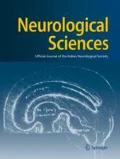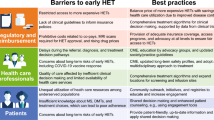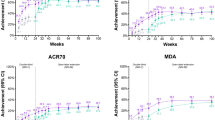Abstract
Background and aim
Peginterferon beta-1a (Plegridy) offers the advantage of a prolonged half-life with less-frequent administration and a higher patient adherence. However, the use of an interferon may lead to flu-like symptoms (FLS) and injection-site reactions (ISR) that results in drug discontinuation. The objective of this Delphi analysis was to obtain consensus on the characteristics and management of FLS/ISR of peginterferon beta-1a in patients with relapsing-remitting MS based on real-world clinical experiences.4
Methods
A steering committee of MS neurologists and nurses identified issues regarding the features and management of adverse events and generated a questionnaire used to conduct three rounds of the Delphi web survey with an Italian expert panel (54 neurologists and nurses).
Results
Fifty-three (100%), fifty-one (96.22%), and forty-two (79.24%) responders completed questionnaires 1, 2, and 3 respectively. Responders reported that, during the first 6 months of treatment, FLS generally occurred 6–12 h after injection; the fever tended to resolve after 12–24 h; otherwise, FLS lasted up to 48 h. FLS improved or disappeared after 6 months of treatment in most cases. Paracetamol was recommended as the first choice for managing FLS. Erythema was the most common ISR and usually resolved within 1 week after injection. Responders reported that the adherence to treatment increases after adequate patient education on the drug’s tolerability profile.
Conclusions
Patient education and counseling play a key role in promoting adherence to treatment especially in the first months also in patients switching from nonpegylated IFNs to peginterferon beta-1a.




Similar content being viewed by others
Data availability
The data that support the findings of this study are available from the corresponding author (CC) upon reasonable request.
Change history
22 January 2021
A Correction to this paper has been published: https://doi.org/10.1007/s10072-021-05083-8
References
Polonsky WH, Henry RR (2016) Poor medication adherence in type 2 diabetes: recognizing the scope of the problem and its key contributors. Patient Prefer Adherence 10:1299–1307
Jung O, Gechter JL, Wunder C, Paulke A, Bartel C, Geiger H, Toennes SW (2013) Resistant hypertension? Assessment of adherence by toxicological urine analysis. J Hypertens 31:766–774
Klauer T, Zettl UK (2008) Compliance, adherence, and the treatment of multiple sclerosis. J Neurol 255(Suppl 6):87–92
Sabate E (2003) Adherence to long-term therapies: evidence for action. World Health Organization, Switzerland
Hutchinson M (2005) Treatment adherence: what is the best that can be achieved? Int MS J 12:73
Treadaway K, Cutter G, Salter A, Lynch S, Simsarian J, Corboy J, Jeffery D, Cohen B, Mankowski K, Guarnaccia J, Schaeffer L, Kanter R, Brandes D, Kaufman C, Duncan D, Marder E, Allen A, Harney J, Cooper J, Woo D, Stüve O, Racke M, Frohman EM (2009) Factors that influence adherence with disease-modifying therapy in MS. J Neurol 256:568–576
Steinberg SC, Faris RJ, Chang CF, Chan A, Tankersley MA (2010) Impact of adherence to interferons in the treatment of multiple sclerosis: a non-experimental, retrospective, cohort study. Clin Drug Investig 30:89–100
Costello K, Kennedy P, Scanzillo J (2008) Recognizing nonadherence in patients with multiple sclerosis and maintaining treatment adherence in the long term. Medscape J Med 10:225
Baker DP, Pepinsky RB, Brickelmaier M, Gronke RS, Hu X, Olivier K, Lerner M, Miller L, Crossman M, Nestorov I, Subramanyam M, Hitchman S, Glick G, Richman S, Liu S, Zhu Y, Panzara MA, Davar G (2010) PEGylated interferon beta-1a: meeting an unmet medical need in the treatment of relapsing multiple sclerosis. Interferon Cytokine Res 30:777–785
Calabresi PA, Kieseier BC, Arnold DL, Balcer LJ, Boyko A, Pelletier J, Liu S, Zhu Y, Seddighzadeh A, Hung S, Deykin A, ADVANCE Study Investigators (2014) Pegylated interferon β-1a for relapsing-remitting multiple sclerosis (ADVANCE): a randomised, phase 3, double-blind study. Lancet Neurol 13:657–665
Kieseier BC, Arnold DL, Balcer LJ, Boyko AA, Pelletier J, Liu S, Zhu Y, Seddighzadeh A, Hung S, Deykin A, Sheikh SI, Calabresi PA (2015) Peginterferon beta-1a in multiple sclerosis: 2-year results from ADVANCE. Mult Scler 21:1025–1035
Bhargava P, Newsome SD (2016) An update on the evidence base for peginterferon β1a in the treatment of relapsing-remitting multiple sclerosis. Ther Adv Neurol Disord 9:483–490
Murphy MK, Black NA, Lamping DL et al (1998) Consensus development methods, and their use in clinical guideline development. Health Technol Assess 2:i–iv 1-88
Hasson F, Keeney S, McKenna H (2000) Research guidelines for the Delphi survey technique. J Adv Nurs 32:1008–1015
Devonshire V, Lapierre Y, Macdonell R (2011) The Global Adherence Project (GAP): a multicenter observational study on adherence to disease-modifying therapies in patients with relapsing-remitting multiple sclerosis. Eur J Neurol 8:69–77
Giovannoni G, Southam E, Waubant E (2012) Systematic review of disease-modifying therapies to assess unmet needs in multiple sclerosis: tolerability and adherence. Mult Scler 18:932–946
Halper J, Centonze D, Newsome SD, Huang DR, Robertson C, You X, Sabatella G, Evilevitch V, Leahy L (2016) Management strategies for flu-like symptoms and injection-site reactions associated with peginterferon beta-1a: obtaining recommendations using the Delphi technique. Int J MS Care 18:211–218
Hendin B, Huang D, Wray S, Naismith RT, Rosenblatt S, Zambrano J, Werneburg B (2017) Subcutaneous peginterferon β-1a injection-site reaction experience and mitigation: Delphi analysis of the ALLOW study. Neurodegener Dis Manag. 7:39–47
Naismith RT, Hendin B, Wray S et al (2019) Patients transitioning from non-pegylated to pegylated interferon beta-1a have a low risk of new flu-like symptoms: ALLOW phase 3b trial results. Mult Scler J Exp Transl Clin 5:2055217318822148
Reess J, Haas J, Gabriel K, Fuhlrott A, Fiola M (2002) Both paracetamol and ibuprofen are equally effective in managing flu-like symptoms in relapsing-remitting multiple sclerosis patients during interferon beta-1a (AVONEX) therapy. Mult Scler 8:15–18
Rice GP, Oger J, Duquette P (1999) Treatment with interferon beta-1b improves quality of life in multiple sclerosis. Can J Neurol Sci 26:276–282
Río J, Nos C, Bonaventura I (2004) Corticosteroids, ibuprofen, and acetaminophen for IFNbeta-1a flu symptoms in MS: a randomized trial. Neurology 63:525–528
Mohr DC, Goodkin DE, Likosky W (1996) Therapeutic expectations of patients with multiple sclerosis upon initiating interferon beta-1b: relationship to adherence to treatment. Mult Scler 2:222–226
Kolb-Mäurer A, Sunderkötter C, Kukowski B, Meuth SG, members of an expert meeting (2019) An update on peginterferon beta-1a management in multiple sclerosis: results from an interdisciplinary Board of German and Austrian Neurologists and dermatologists. BMC Neurol 19:130
Acknowledgements
The authors would like to thank the neurologists and nurses who participated in the Delphi study: Lucia Alivernini, Marta Altieri, Annalisa Amidei, Antonella Andreotti, Pietro Osvaldo Luigi Annovazzi, Emilia Basta, Valeria Barcella, Elisabetta Bertini, Annarita Bitetti, Sebastiano Bucello, Martina Campobasso, Marco Capobianco, Patrizia Carta, Elena Cavone, Raffaella Cerqua, Marta Conti, Tommaso Corlianò, Emanuele D'Amico, Elisabetta Di Monte, Sabrina Fabbri, Damiano Faccenda, Paola Gazzola, Clara Guaschino, Shalom Haggiag, Pietro Iaffaldano, Claudia Liguori, Maria Liguori, Giacomo Lus, Simona Malucchi, Giorgia Mataluni, Marina Marchelli, Carmelina Moio, Elena Mutta, Marina Panealbo, Livia Pasquali, Federica Pinardi, Simona Pontecorvo, Pierangela Riani, Daniela Rivola, Marzia Anita Lucia Romeo, Luca Santarelli, Elisabetta Signoriello, Giuseppa Silvestro, Isabella Laura Simone, Rosa Tarantino, Mauro Zaffaroni, and Eleonora Zanella.
Funding
The Consensus Delphi “Pegylated interferon beta 1a (Plegridy) Italian real-world experience: a Delphi analysis of injection-site reaction and flu-like symptom management” was funded by Biogen Italia and managed with the support of Fullcro S.R.L.
Author information
Authors and Affiliations
Contributions
All authors contributed to the study conception, design, and writing of the manuscript. All authors read and approved the final manuscript.
Corresponding author
Ethics declarations
Conflicts of interest
The authors declare that they have conflicts of interest.
Ethical approval
Not applicable
Consent to participate
Informed consent was obtained from all individual participants (neurologists and nurses) included in the study.
Code availability
Not applicable
Additional information
Publisher’s note
Springer Nature remains neutral with regard to jurisdictional claims in published maps and institutional affiliations.
The original online version of this article was revised: The original article contains an error. In Table 1, the statement 11bis has been deleted. The correct Table 1 is presented here.The original article contains an error. In Table 1, the statement 11bis has been deleted. The correct Table 1 is presented here.
Rights and permissions
About this article
Cite this article
Cordioli, C., Callari, G., Fantozzi, R. et al. Pegylated interferon beta-1a (Plegridy) Italian real-world experience: a Delphi analysis of injection-site reaction and flu-like symptom management. Neurol Sci 42, 1515–1521 (2021). https://doi.org/10.1007/s10072-020-04969-3
Received:
Accepted:
Published:
Issue Date:
DOI: https://doi.org/10.1007/s10072-020-04969-3




